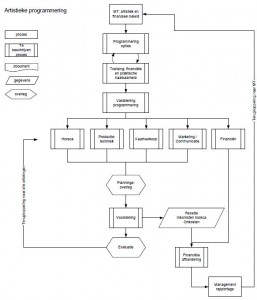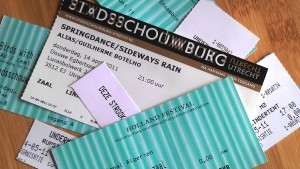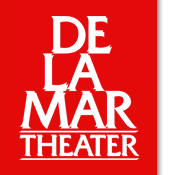In this ICT project management section of the site, you find under the Applications heading a multitude of ways to support work processes with the help of automation. In order to utilise these properly you must have a clear picture of your organisation’s work processes.

Process scan
TOT has developed a process scan: a way to analyse and clearly outline work processes. Process analysis is a logical product for Marijcke Voorsluijs who, as an industrial psychologist and the owner of TOT, thoroughly understands the business processes within the cultural sector. » read on about Process analysis
A process scan is a structured way to outline work processes. Within a cultural organisation, such a work process could, for example, be the realisation of a performance, exhibition or event – from the draft concept right up to evaluation.
Relay race
An organisation produces products and has suppliers and buyers. Within the organisation, each department produces a (partial) product with its own suppliers and buyers. The work process up to the product is a ‘relay race’ whereby different people or departments in turn pass the baton on to one another.
A process scan is achieved by interviewing key people (usually departmental heads) about their position within the relay race and their role in the realisation of the organisation’s products. » read on about Process scan at work
Scheduling in the cultural sector
Personnel scheduling is not unique to the world of culture. An airline company schedules pilots; a railway operator, conductors; hospitals, nursing staff; and the security sector, guards – all of whom work irregularly. However, events-guided scheduling is unique to the cultural sector. No fixed day, evening or weekend shifts, but a scenery building shift, one for sound, welcoming the public, guided tours or ticket sales, with times and staff levels determined by the performance or event. » read on about Personnel scheduling
A process scan is not a document to be glanced at now and again. It can prove invaluable in practice.
A process scan:
- Is a tool to help you train new staff quicker;
- Shows the place and function of everyone’s work in the bigger picture;
- Shows the key moments within the process; if these are not (adequately) completed then the following stage will commence, but on an unstable foundation;
- Offers the possibility to translate the event-related steps into an event blue print – and even to refine it into a task list per department; » read on about The value of a process scan to your organisation
An eye on communication
Communication is everything: in the world of culture, just as everywhere else. Yet it does not always happen on its own. Seemingly opposing interests, different cultures, new legislation and regulation or organisational growth are all potential areas of conflict or friction.
At TOT, Marijcke Voorsluijs combines her industrial psychology expertise with more than 20 years of work experience in the cultural sector. She has resolved many issues for her clients, either on her own or in collaboration with other specialists in her network. » read on about Project management
The time clock
Associations with the factory from Modern Times come to mind when thinking about the time clock. Although the punch card is replaced with a pass or badge, the principle remains the same: each staff member starting work signs in, and those who have finished work sign out. Nowadays, instead of a clock there’s a terminal where you can find your holiday entitlement, register visits to the doctor or report as working offsite. » read on about Time tracking
Cold, hard cash

Where is the money earned? At the box office! Visitors buy tickets for events, exhibitions, performances or concerts. And nowadays you will not find an amiable employee behind a cashbox with a notebook. Instead, they sit behind the computer, ask for the postal code and house number, enter the number of tickets, click Print and make payment. Whether it is online or at the box office, in cash or by bank transfer, all sales run through the same computer program. » read on about Ticket sales

Many cultural organisations do not use a CRM program. At least, that is what they think. They dabble in CRM but do not have a specific program for it, which is not always necessary. You can do more with Outlook than you think. Excel is great for maintaining addresses and removing duplicates. Nearly every event scheduling or ticket sale program has a CRM option. If this is enough for you, do not let yourself be talked into getting a separate CRM package, as slick as it may seem. Why buy an expensive program when the software you have already fits the bill? » read on about CRM
Cultural organisations can no longer do without private financing. Crowd funding is hot, but organisations still seek ways to recruit sponsors, donors and friends.

That entails all kinds of activities:
- Finding potential donors;
- Keeping a record of who has been approached, when and how;
- Determining who has reacted to a mail or telephone campaign;
- Registering donations, and receiving and checking payments;
- Sending annual reminders and thank yous for gifts received.
- If you have a limited number of sponsors and donors or a tight-knit group run by volunteers, Excel is the perfect tool for recording addresses and donations.
However, you could also purchase a program for this purpose. » read on about Fundraising

Contemporary chic
DeLaMar is a contemporary two-auditorium theatre (more than 1500 seats), a Grand Café and various foyers that are also suitable for events. An exceptional photo collection hangs in the foyers. Janine van den Ende purchased various works, but in particular commissioned five prominent Dutch art photographers with the theme of ’theatre’. Erwin Olaf, Viviane Sassen, Hans Eijkelboom, Cuny Janssen and Koos Breukel each provided their own interpretation of this theme. » read on about DeLaMar Theatre



